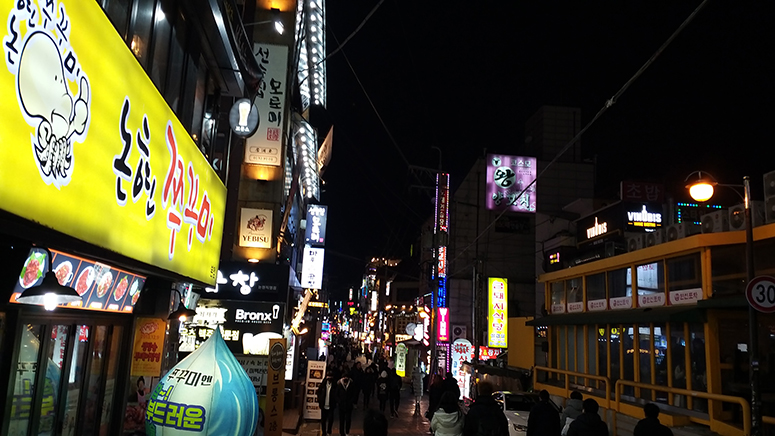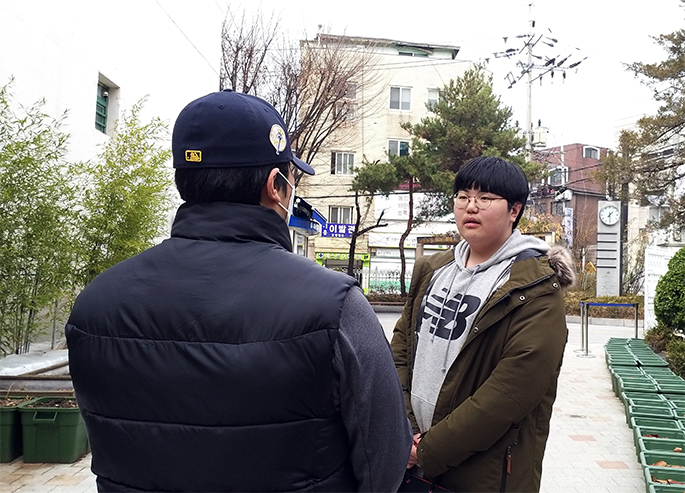Alleyways crammed with eateries and watering holes like bars and pubs have a special name in Korea: Meokja Golmok (Meokja meaning “Let’s eat!” and Golmok meaning “alleyway”). Thanks to Korea’s culinary culture— people tend to eat in big groups—numerous Meokja Golmoks have formed in many towns across the country. Here, you can find bewildering variety of foods like Japanese Sushi, Pajeon (Korean-style pancakes), Gukbap (soupy delicacy that one must try if ever in Korea), Chi-mek (fried chicken and beer), and Jokbal (pork’s feet, another delicacy), and many more. Some Meokja Golmoks are famous even among tourists to visit. Hence, these alleyways are an important part of the Korean culture. Meokja Golmoks are excellent gathering spots, especially during the evening and night times. The problem is that people who actually live in or near a Meokja Golmok must suffer from the noise and boisterous behavior of the people having a little too much fun day in and day out.

Every night, one can see loud singing or shrieks from drunken men, and sometimes, brawls. Every morning, one sees the aftermath of wild revelry the night before: the pukes and the litters. The pukes not only look unpleasant but also stink and elementary school students have to walk by it on their way to school in the morning. This is not good. For students, it is a nightly struggle to get their studying done while being bombarded with all the hollering and singing coming in through the window.

A father whose daughter attends Nonhyeon Elementary School near Meokja Golmok complains, “As a resident who has lived here for more than five years, I’ve seen so much puke every morning when I take my daughter to school.” The filthy mess is never good for children to look at. And my daughter often gets awakened in the middle of the night by the noises coming from the Meokja Golmok, sometimes it continues until the next morning.” He also says that drunken men roaming the streets can be seen whenever he strolls the streets with his daughter—not good for her little girl’s psychological development.
This is the ugly side of the Meokja Golmok culture. What makes matters worse is that many restaurants in the area are open 24 hours a day, whereas most restaurants in New York, one of the biggest cities in the world, close at 2 A.M.
This distinct Meokja Golmok culture first started during the 1988 Seoul Summer Olympics and flourished during the 2002 FIFA World Cup both of which Korea hosted, according to a report by the Korea Economic Daily and Sky Daily. When you think about it, this makes sense since when people get together to cheer for an event, it is natural for them to have alcoholic beverages with their food.
Having been a resident of an apartment building near a famous Meokja Golmok for the past 10 years, I completely sympathize with the other residents who suffer through the same things I do day and night. When I study at night, I even have to wear ear plugs to keep the noises out. It is certainly not pleasant to step over puke on my way to school in the morning. What’s the solution? Perhaps the residents and the revelers of Korea’s Meokja Golmok can enter into a truce—an agreement that all businesses in Meokja Golmoks close by 2 A.M. This way, residents respect others’ right to enjoy themselves in Meokja Golmoks and the revelers respect the residents’ peace and quiet. The question is who will hang the bell on the tiger’s neck.

Eric Shin
Sophomore (Grade 10)
Shepherd International Education

